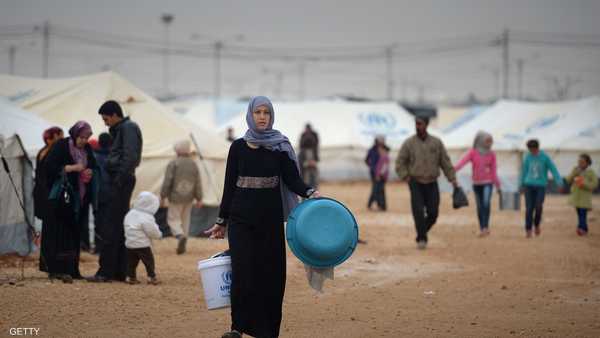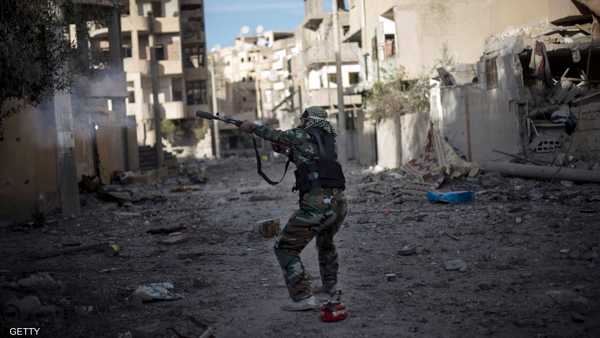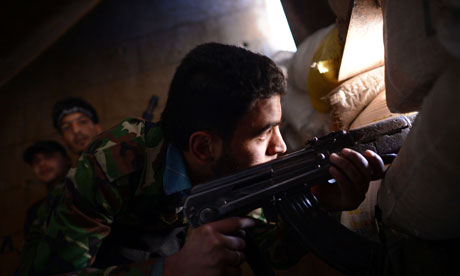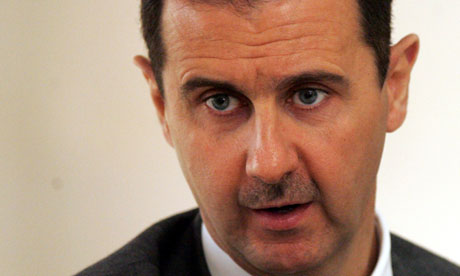سورية:الأردن يلعب بالنار بمساعدته للثوار ..و بشار: لعقود من عدم الاستقرار سيعاني الشرق الأوسط إذا كسب الثوار
الأسد يحذر من "تأثير الدومينو" لتقسيم سوريا
حذر الرئيس السوري بشار الأسد الجمعة من "تأثير الدومينو" في حال "تقسيم" بلاده الغارقة في نزاع دام منذ عامين أو سقوط نظامه، قائلا إن دول الجوار ستعاني من عدم استقرار سيستمر "سنوات وربما عقودا طويلة".
وقال الأسد في مقابلة مع قناة "أولوصال" وصحيفة "إيدنليك" التركيتين: "الكل يعرف أنه إذا حصل في سوريا اضطراب وصل إلى مرحلة التقسيم أو سيطرة القوى الإرهابية في سوريا أو كلا الحالتين، فلا بد (من) أن ينتقل هذا الوضع مباشرة إلى الدول المجاورة أولا، وبعدها بتأثير الدومينو إلى دول ربما بعيدة في الشرق الأوسط".
وأضاف في المقابلة التي بثتها صفحة المكتب الإعلامي في الرئاسة السورية على موقع "فيسبوك" مساء الجمعة: أن الأمر "يعني خلق حالة من عدم الاستقرار لسنوات وربما لعقود طويلة". وسجلت المقابلة مع الأسد الثلاثاء وبثت مقاطع قصيرة منها في الأيام الماضية.
واتهم الأسد رئيس الوزراء التركي رجب طيب أردوغان الذي تدعم بلاده المعارضة السورية، بعدم قول "كلمة صدق واحدة" منذ بدء الأزمة السورية منتصف مارس 2011. كما اعتبر أن جامعة العربية "بحاجة إلى شرعية"، وذلك ردا على منحها مقعد دمشق إلى الائتلاف الوطني لقوى الثورة والمعارضة.

ربع السوريين هجروا منازلهم
نحو أربعة ملايين سوري نزحوا عن منازلهم داخل سوريا، ونحو مليون و200 ألف لاجئ أجبروا على المغادرة للدول المجاورة.
في غضون ذلك، قدرت مسؤولة الاتصال الإقليمية في مفوضية الأمم المتحدة للاجئين ريم السالم، عدد النازحين داخل الأراضي السورية منذ اندلاع العنف في مارس 2011 بنحو أربعة ملايين. وأضافت أن "إن الأمم المتحدة تعمل مع شركائها على إعادة النظر في الأرقام والحلول الواجب تقديمها قبل نهاية السنة".
ويضاف الأربعة ملايين نازح داخل الأراضي السورية إلى نحو مليون و200 ألف لاجئ أجبروا على مغادرة بلدهم إلى الدول المجاورة في كل من الأردن ولبنان وتركيا والعراق، حسب المفوضة العليا للاجئين. وهذا يعني أن ربع السوريين البالغ عددهم نحو 22 مليونا أجبروا على ترك منازلهم واللجوء إلى أماكن أخرى داخل أو خارج سوريا.
وفي الأردن، أفاد الناطق الإعلامي لشؤون اللاجئين السوريين في الأردن أنمار الحمود أن "عدد اللاجئين السوريين الذين عادوا إلى بلدهم طوعا منذ اندلاع الازمة في سوريا بلغ 34 ألفا و824 لاجئا".
وأضاف أن "الجهات المعنية وعلى رأسها الأمن العام وحرس الحدود، أمنت أمس (الخميس) عودة نحو 2500 لاجئ من مخيم الزعتري (85 كم شمال شرق عمان) طواعية إلى بلدهم بناء على طلبهم". وتستضيف المملكة أكثر من 475 ألف لاجئ سوري، وفقا للمسؤولين، منهم ما يزيد عن 146 ألفا بمخيم الزعتري قرب الحدود مع سوريا.

السيطرة على حاجز عسكري
ميدانيا، سيطر مقاتلون معارضون على حاجز عسكري في بلدة بجنوب سوريا قريبة من الحدود الأردنية، في حين تتواصل أعمال العنف على أطراف دمشق وفي محيطها، بحسب ما أفاد المرصد السوري لحقوق الانسان.
وقال المرصد "سيطر مقاتلون من الكتائب المقاتلة على حاجز أم المياذن العسكري في بلدة أم المياذن في ريف درعا (جنوب)" القريبة من الطريق السريع الدولي بين دمشق ودرعا، وذلك اثر اشتباكات أودت بمقاتلين اثنين.
وقالت الهيئة العامة للثورة السورية "إن المقاتلين سيطروا على الحاجز "بالكامل بعد انسحاب ما تبقى من عناصره إلى المنطقة الحرة على الحدود السورية الأردنية".
وفي دمشق، قال المرصد أن سبعة أشخاص بينهم طفلان قتلوا جراء "القصف الصاروخي الذي تعرض له حي برزة" (شمال)، في حين تدور اشتباكات على أطرافها لا سيما في جوبر (شرق).
من جهتها، افادت وكالة الانباء الرسمية السورية (سانا) أن القوات النظامية "اشتبكت مع مجموعات إرهابية في محيط الجامع الكبير وإلى الشرق من بناء المعلمين في حي جوبر"، كما "أردت أفراد مجموعة إرهابية" في حي برزة.
Syria says Jordan 'playing with fire' over assistance to rebels
Jordan tightens security along Syrian border as tensions soar amid reports of arms shipments to anti-Assad forces

A Syrian rebel observes the positions of regime forces in Saif al-Dawla district in the northern city of Aleppo. Photograph: Dimitar Dilkoff/AFP/Getty Images
Jordan is facing mounting tension with neighbouring Syria amid signs that it has moved to a more active role in support of the rebels fighting to overthrow President Bashar al-Assad's government.
The border between the countries was reinforced on the Jordanian side on Thursday after Syrian state media warned the western-backed kingdom it was "playing with fire" and poised "on the edge of a volcano" by backing the opposition.
Recent weeks have seen a spate of reports about arms shipments from Jordan to anti-Assad rebels who have been making gains around Deraa, the Syrian city closest to the border. Opposition sources say the military situation reflects enhanced supplies and training.
Barack Obama discussed the crisis with King Abdullah II in Amman on his Middle East tour last month. Jordan was the only Arab state the US president visited – an indication of the pressure the king is under to be more supportive of the Gulf-driven effort to drive Assad from power.
Diplomats say they have discussed plans for a buffer zone in southern Syria as well as accelerated training for rebel fighters by the US and Jordan. British and French special forces are reported to be involved in training, advice, logistics and intelligence support.
In an apparent reflection of nervousness about the issue, a government spokesman in Amman insisted on Friday that Jordan was "not part of the conflict" in Syria and maintained its support for a "peaceful solution" – the formal stance of all Arab states. The spokesman refused to comment either on the training or the buffer zone, the Al-Ghad newspaper reported.
The Washington Post cited Jordanian security officials this week as saying that a plan to complete the training of 3,000 Free Syrian Army officers by the end of June has been brought forward to the end of April in light of the border victories. The FSA is backed by western and Arab governments as a bulwark against the rise of Salafi or Jihadi-type Islamist groups.
Jordanian sources describe a "double discourse" – an official one that reiterates the formal position alongside clandestine training and Saudi-financed arms supplies delivered with the help of the CIA. Jordan's powerful Mukhabarat secret service enjoys a close relationship with its western partners, including MI6.

"The Jordanians are happy to channel support but they say 'don't put us in the front line'," said a Syrian opposition figure. "They used to be afraid that Assad's intelligence system could hit back and hurt Jordan but now he is weak they feel emboldened to be more active."
Jordanian officials repeatedly speak of the gravity of the Syrian crisis, with concern focusing on the flow of refugees across the border and the risk that extremist elements will come with them.
"Jordan can't sit idle and watch al-Qaida and other militants seizing control of its … border with Syria," Jordan's information minister, Sameeh Maaytah, was quoted as saying. "It must take proactive steps to arrive at a state of equilibrium in the security structure on the border."
An estimated 460,000 Syrian refugees are in Jordan. In one 24-hour period this week, 1,967 arrivals were recorded. If the influx continues at the current rate, Jordan could be hosting more than 1 million refugees by the end of 2013.
Abdullah Ensour, the newly appointed prime minister, has warned publicly of a "catastrophic" situation" and used even stronger language in private, according to sources in Amman.
Domestic strains have also been evident in complaints about the number of Syrian refugees. Several MPs are calling for the closure of the border. Abdul Karim al-Dughmi, a conservative politician, criticised the government's "timid position" on the crisis and blamed a "conspiracy by some Arab states" for the unrest.

Middle East will be unstable for decades if rebels win in Syria, says Assad
Syrian leader warns of domino effect and accuses Arab neighbours of sheltering rebels who seek to overthrow him

Bashar al-Assad has called Turkey's leaders 'foolish and immature' for helping Syrian rebels who seek his removal from power. Photograph: Sasha Mordovets/Getty Images
The Syrian president, Bashar al-Assad, has warned that the Middle East faces being destabilised for decades if rebel forces battling to overthrow him succeed..
Assad, locked in a two-year conflict he says has been fuelled by his regional enemies, also criticised Turkey's "foolish and immature" leaders and accused Arab neighbours of arming and sheltering rebel fighters.
"If the unrest in Syria leads to the partitioning of the country, or if the terrorist forces take control … the situation will inevitably spill over into neighbouring countries and create a domino effect throughout the Middle East and beyond," he said in an interview with Turkish television.
Turmoil would spread "east, west, north and south. This will lead to a state of instability for years and maybe decades to come," Assad said in the interview, posted by the Syrian presidency on the internet.
The UN says at least 70,000 people have been killed in Syrian's conflict. Daily death tolls of around 200 are not uncommon, monitoring groups say. More than a million refugees have fled the country and the Syrian Red Crescent says nearly four million have been internally displaced.
Neighbouring Lebanon and Jordan are both struggling to cope with the flood of refugees, while the sectarian element of the conflict – with mainly Sunni Muslim and Islamist fighters battling a president from Syria's Alawite minority – has also raised tensions in neighbours such as Lebanon and Iraq.
While accusing opponents of using "sectarian slogans", Assad said the essence of the battle was between "forces and states seeking to take their people back into historic times, and states wanting to take their peoples into a prosperous future".
He appeared to be referring to Sunni Muslim Gulf states Saudi Arabia and Qatar, which have supported efforts to arm insurgents in an uprising which began with peaceful protests for reform and spiralled into civil war.
Assad said Turkey's prime minister, Tayyip Erdogan, was recruiting fighters with Qatari money to wage war in Syria, but warned his former friend that the bloodshed could not easily be contained. "The fire in Syria will burn Turkey. Unfortunately he does not see this reality," Assad said. Erdogan, he said, "has not uttered a single truthful word since the crisis in Syria began".
Assad also condemned the Arab League, which has suspended Syria's membership and last month invited opposition leaders Moaz Alkhatib and Ghassan Hitto to attend a summit meeting in his place.
"The Arab League itself lacks legitimacy," he said. "It is an organisation which represents Arab states and not Arab people. It has lacked legitimacy for a long time because these Arab states themselves … do not reflect the will of the Arab people."
Assad also dismissed Western countries that have condemned his suppression of protest as hypocrites. "France and Britain committed massacres in Libya with the support and cover of the United States. The Turkish government is knee-deep in Syrian blood. Are these states really concerned about Syrian blood?" Responding to rumours of his assassination spread by activists and fighters over the last two weeks, Assad said he was living as ever in Damascus, despite rebel advances in the outskirts of the city and regular mortar attacks on its centre.
"I am not hiding in a bunker. These rumours (aim) to undermine the morale of the Syrian people. I neither live on a Russian warship nor in Iran. I live in Syria, in the same place I always did."
On Saturday troops loyal to Assad fought rebels in a town outside Damascus, according to opposition. In the north, warplanes hit rebel-held areas of Aleppo, Syria's largest city, killing five people.
The Britain-based Syrian Observatory for Human Rights says Saturday's fighting was concentrated around the town of al-Otaybah, east of Damascus. The south-eastern Damascus suburb of Jaramana was hit by several mortar rounds, the group said. It sources its reports of daily fighting to a network of activists on the ground.


تعليقات